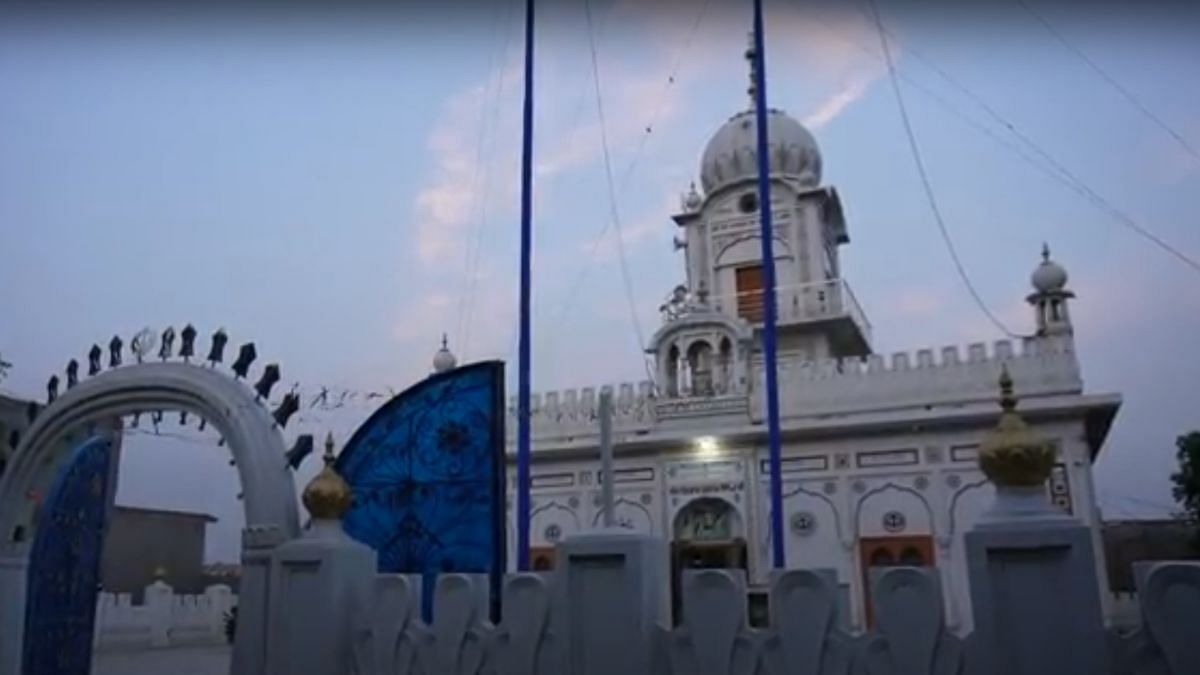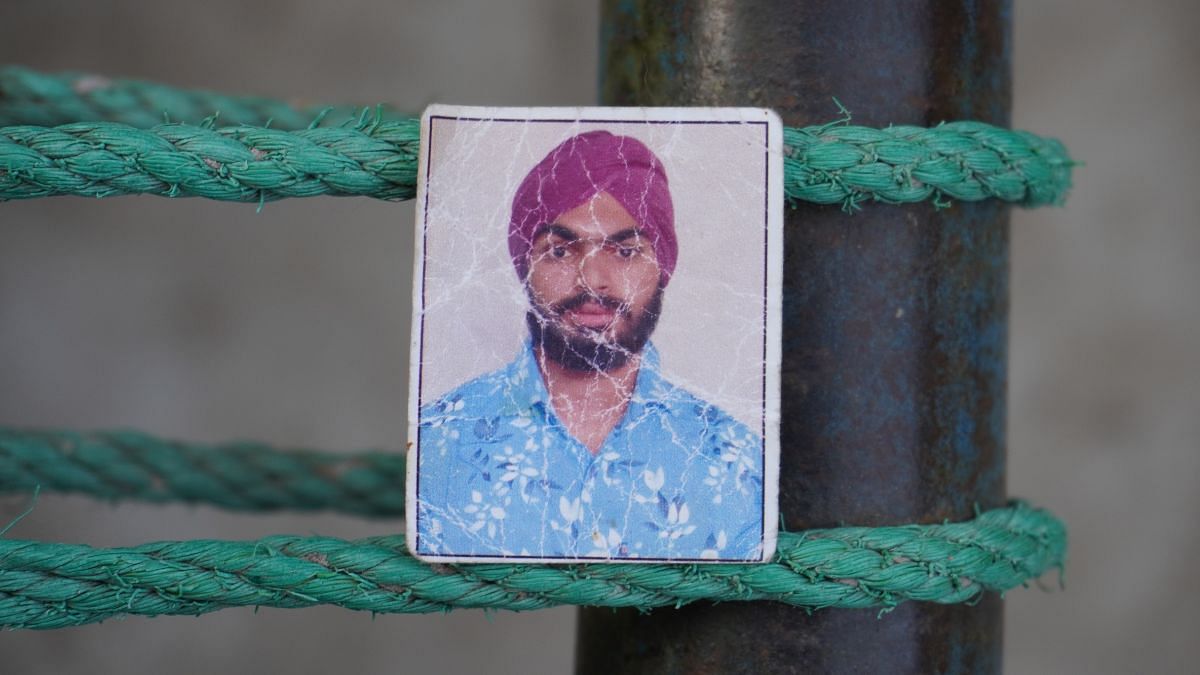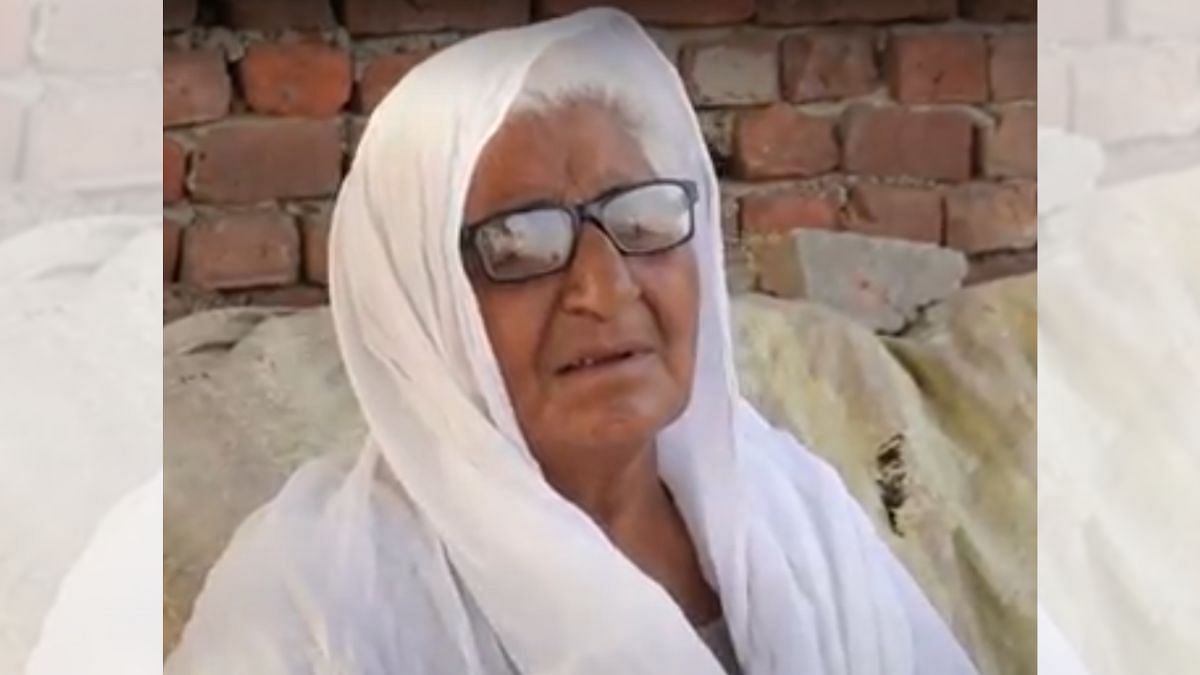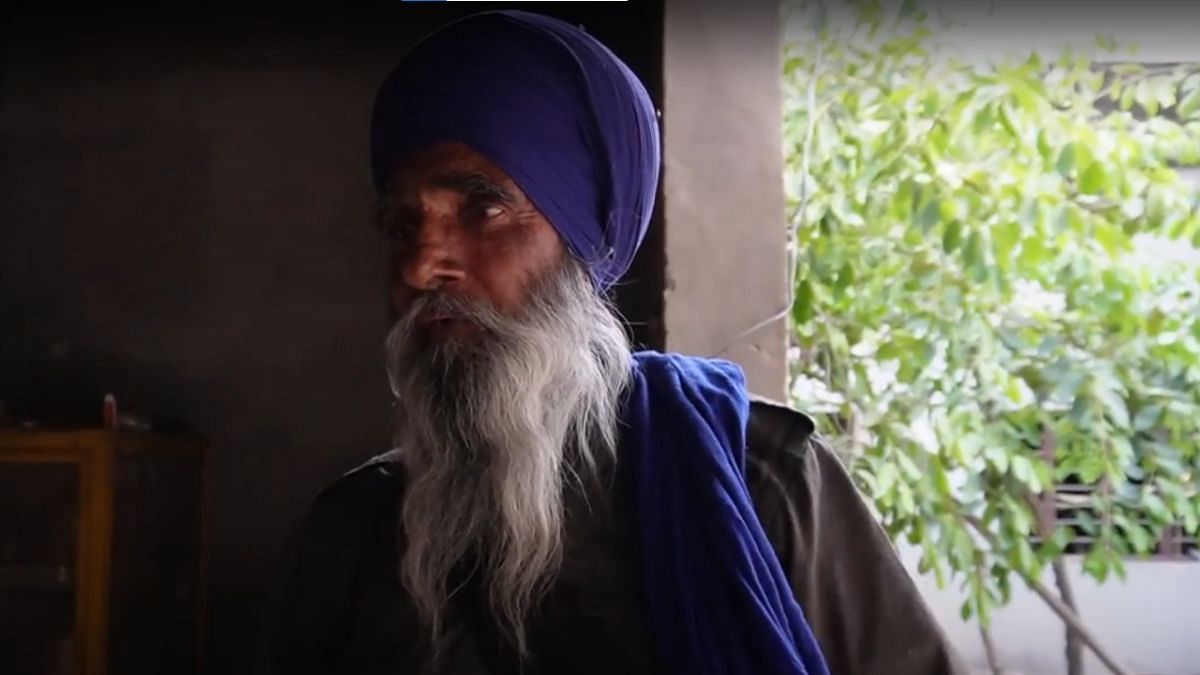Ferozepur: Lakhvinder Singh sits on a charpoy outside his home in the quiet border village of Bagguwala, nestled along the India-Pakistan border in Ferozepur. He is surrounded by a close-knit circle of family and fellow villagers.
On 4 May, his 19-year-old son, Bakshish Singh, was lynched by a mob right before his eyes.
Bakshish, who, Lakhvinder said, had been battling a “mental illness” for four years, had wandered into a gurdwara in the neighbouring Bandala village and torn a page of the Guru Granth Sahib, considered to be a living Guru by the Sikhs. The act of tearing a page from the Guru Granth Sahib amounts to physically attacking the Guru and injuring him.
The gurdwara’s caretakers and bystanders, driven by rage, took it upon themselves to render “instant justice” for the crime and thrashed Bakshish to his death.

Bakshish’s lynching is the latest in a string of cases of “instant justice” doled out by angry protesters and onlookers in incidents of suspected sacrilege in Punjab in the past few years.
Lakhvinder was home when villagers rushed to inform him about what had happened. He rushed to the gurdwara, barely a kilometre away, to save his son, only to find him critically injured, lying on the floor, unresponsive to the chaos around him.
“He was severely injured but was still breathing,” Lakhvinder told ThePrint.
Amid the chaos, a man from the mob dealt grievous blows to Bakshish’s neck and legs with a kirpan, while his father pleaded for mercy for his son.

The incident was captured on a mobile phone by an onlooker, and the video was later widely circulated on social media.
Amid the chaos, a desperate Lakhvinder tried to show the mob a sheaf of documents — prescriptions, diagnosis, and blood reports — hoping to prove his son’s condition and the unintentional nature of his actions, but his efforts were in vain.
Bakshish died on the spot — his face, neck and legs cut up and bleeding.
On Lakhvinder’s complaint, an FIR for murder was registered the same day against two identified accused and 20 unidentified persons. The man seen in the video hitting Bakshish with the kirpan was identified as Jarnail Singh, a resident of Bandala village, later arrested.
Jarnail is also an accused in a drug peddling case under the Narcotic Drugs and Psychotropic Substances Act, 1985. “Everyone in the village knows him as a smackia (one who consumes smack). He has also been supplying drugs to youngsters in our villages,” a neighbour sitting with Lakhvinder told ThePrint.
“Apart from Jarnail Singh, the other person who is responsible for my son’s death is Lakhvir Singh. When I reached the gurdwara, my son was injured but alive and the mob seemed to have calmed down. Suddenly, Lakhvir Singh raised a slogan of death to my son. He told the mob that it seemed that they had lost their conscience and were allowing a person who had attacked their father (Guru Granth Sahib) to go scot-free. He instigated the mob and that is when Jarnail started hitting my son, leading to his death,” alleged Lakhvinder.

Lakhvir Singh is yet to be arrested. “We are still verifying his role in the murder,” Station House Officer (SHO), Arifke, Balraj Singh, told ThePrint Monday.
According to Lakhvinder, since filing the complaint, a senior figure from the gurdwara and some local religious leaders have visited his home, urging him to retract his complaint and reach a settlement with the gurdwara. “But we refused,” he said.
Meanwhile, on a complaint from the gurdwara and based on CCTV footage showing Bakshish tearing a page from the Guru Granth Sahib, police registered a case posthumously under Indian Penal Code (IPC) section 295A (sacrilege) against him on 4 May.
On the part of authorities, while the Akal Takth — highest seat of authority of the Sikhs — ordered social ostracisation of Lakhvinder’s family, Shiromani Gurdwara Parbandhak Committee (SGPC) president Harjinder Singh Dhami, in a statement on 5 May, blamed the inability of governments to grant justice in such cases, which he said led people to take law into their own hands. Akal Takht jathedar Giani Raghbir Singh even went on to direct that no gurdwara should cooperate with the family in conducting the last rites of the “accused”.
ਅੱਜ ਫਿਰੋਜ਼ਪੁਰ ਜ਼ਿਲ੍ਹੇ ਦੇ ਪਿੰਡ ਬੰਡਾਲਾ ਦੇ ਗੁਰਦੁਆਰਾ ਬਾਬਾ ਬੀਰ ਸਿੰਘ ਵਿਖੇ ਸ੍ਰੀ ਗੁਰੂ ਗ੍ਰੰਥ ਸਾਹਿਬ ਜੀ ਦੀ ਬੇਅਦਬੀ ਦੀ ਘਟਨਾ ਨਾਲ ਗਹਿਰਾ ਦੁੱਖ ਪੁੱਜਾ ਹੈ। ਬੇਅਦਬੀ ਦੇ ਦੋਸ਼ੀ ਦੀ ਹੋਈ ਮੌਤ ‘ਕਾਨੂੰਨ ਦੁਆਰਾ ਦੋਸ਼ੀਆਂ ਨੂੰ ਸਜ਼ਾਵਾਂ ਦੇਣ ’ਚ ਅਸਫਲਤਾ’ ਦਾ ਪ੍ਰਤੀਕਰਮ ਹੈ। pic.twitter.com/8shxit608s
— Giani Raghbir Singh (@J_SriAkalTakht) May 4, 2024
“In the recent past, many incidents of sacrilege of Sri Guru Granth Sahib have taken place, but the police administration and the government have completely failed to stop such incidents,” Dhami said, adding that such incidents are part of a bigger conspiracy, and it is extremely important to bring the forces working behind them to light. He added that due to the government and the police not giving strict and exemplary punishment to the culprits of sacrilege “there has been a lot of anger and resentment among the community.”
According to Dhami, the government, through its machinery, should expose the ‘forces’ behind the incident in Ferozepur. The SGPC president also appealed to the Sangat to make strict arrangements for surveillance and security inside gurdwaras through CCTV cameras and to keep attendants present at all times on guard duty.
At 0.7 percent, Punjab recorded the highest crime rate per lakh population for “religious offences” registered under IPC sections 295 (injuring or defiling a place of worship), 296 (disturbing religious assembly), and 297 (trespassing on burial places) in 2022, the latest year for which data is available. It was followed by Goa, Chhattisgarh, and Madhya Pradesh, where the crime rate for these offences was 0.4 percent.
‘He was my only hope’
Minutes after Bakshish breathed his last on 4 May, angry onlookers turned to Lakhvinder, grabbed the documents in his hands which were proof of his son’s medical condition, tore them into shreds and flung them over his Bakshish’s dead body.
Many villagers who had gathered at the spot asked Lakhvinder to leave, lest the killers direct their anger toward him.
“I ran on my bike and hid for hours before coming back home. Bakshish was taken to a hospital where he was declared dead. My house was teeming with policemen,” recalled Lakhvinder.
“Everyone, not just in our village, but at least four to five neighbouring villages, knew my son’s mental health condition. Yet they killed him. Why? Why did no one protect him?”
Inside the house, Lakhvinder’s wife, Balwinder Kaur, sat in silence in the midst of women relatives. Overwhelmed by the gravity of events, she is unable to speak. “The moment our son’s behaviour began to change four years ago, it’s as if a part of my wife retreated from this world. He was my only hope,” Lakhvinder said, turning to his wife.
The couple also has two daughters, both younger than Bakshish. One has a congenital eye disease and can barely see while the other, the youngest, too, is battling a mental health issue, the parents said.
“I have spent thousands to get my son treated. I barely have two acres of land and I am not even able to make ends meet. And yet I took Bakshish to at least half a dozen hospitals over the past few years. He was on constant medication,” Lakhvinder said, adding that everyone in the village, including the people in the gurdwara, was aware of his situation.
“But no one came forward to protect him,” Lakhvinder added.
However, despite the Akal Takht’s call for a boycott of Bakshish’s last rites, villagers participated in his cremation in large numbers. “This is because everybody knew his condition and felt what the mob had done was wrong,” said Lakhvinder.
‘He did not know what he was doing’
According to the family, it was during his Class XII final exams that Bakshish‘s condition began to deteriorate. He was taking an exam when he became aggressive and destroyed the answer sheets of his peers, said Lakhvinder.
“We got a call from a teacher, who told us to take him home. For eight days he did not eat anything, nor did he leave the house or say anything. Then he started behaving violently in the house as well, tearing pictures and wall hangings. This was four years ago.”
The family first took Bakshish to a local dispensary in Arifke, where he was put on medication. Seeing no improvement, they took him to multiple healthcare facilities in Sodhiwala, Zira, and the civil hospital in Ferozepur, where he was under treatment of psychiatrists. “We even went to see doctors in Faridkot and Tarn Taran,” said Lakhvinder.
“Medicines only put Bakshish to sleep. When awake, his behaviour did not improve. We would try to lock him inside the house but he would jump over the wall and wander off. Once he went missing for a week,” Gurmeet Kaur, Lakhvinder’s sister, told ThePrint.

She added that a police complaint was also filed, but Bakshish was nowhere to be found. “Then we received a call from the schoolteacher that Bakshish had been found in Dwarka in New Delhi. Police found him there and asked him for his parents’ number. He only remembered the number of his teacher. We went to Delhi to bring him back,” she recalled.
The family has left no stone unturned to treat Bakshish, they even knocked on the Golden Temple’s doors. “I wanted him to take a dip in the holy water of the sarovar, hoping that it would cure him,” Lakhvinder said.
Narrating an incident that unfolded at the Golden Temple, the father said: “While we were waiting for our turn in the queue to bow our heads, Bakshish tried to jump the line. He was immediately caught by the sevadaar and taken to a room for questioning. The sevadaar recognised his mental distress and recommended a doctor in Amritsar. Since then, I have been in touch with the doctor, whose medicines Bakshish was currently taking.”
According to Sukhdev Singh, Lakhvinder’s brother, Bakshish would frequent the village gurdwara, but never did anything “objectionable” there — “although he would occasionally return with different slippers”. Bakshish also visited the Bandala gurdwara often and partook in the langar.
On the day of the day of the incident, the family had no idea where he had gone.
“After the incident, I was told by those who had seen him entering that he went there and washed his face and feet, before entering the darbar saab (sanctum sanctorum). After tearing the pages of the Guru Granth Sahib he brought them to granthi ji on duty and handed them over. Would he have done so had he understood the gravity of his actions? My son did not know what he was doing,” said Lakhvinder.
However, the Bandala Gurdwara caretakers (sevadaars) and employees did not agree.
“The boy walked into the gurdwara. When he entered he did not bow down before the Guru Granth Sahib as the others do. He went straight behind the Guru Granth Sahib and removed the rumala saab and tore the pages, knowing very well what he was doing,” claimed Pooran Singh, one of the caretakers of the gurdwara.
He added that it was when Bakshish was stepping out of the premises that he was stopped by the granthi ji to give him prasad. The granthi ji was the one who asked him what he had in his hand. That is when he showed the torn page of the Guru Granth Sahib, Pooran Singh told ThePrint.

“The boy had no remorse. He said he had done what he wanted to and it was up to us what we should do,” he added.
The caretakers said they did not believe that the mob did anything wrong.
“When the incident happened, somebody made a video and circulated it on social media. Within no time, a huge mob gathered around the gurdwara and started beating the boy. How do we know who killed him? The people were very angry. Why will they not be? No one will tolerate an attack like this on their father,” said Pooran Singh.
Though he agreed that Lakhvinder did speak about Bakshish’s mental health condition, “but then why do mentally unsound people come into gurdwaras and commit sacrileges?”
“Ours is a historical gurdwara and we have a mela (fair) here twice a year. Hundreds of devotees come every year and partake in langar. Nobody has ever behaved in this manner. That boy did it intentionally,” alleged Nirvana Singh, another caretaker of the gurdwara.

“When he was being beaten up, he did not make a single sound, he was so motivated,” he added.
According to Nirvana Singh, even when Abdali (Ahmad Shah Durrani, founder of the Durrani Empire), looted Punjab, he did not disrespect the Guru Granth Sahib. “If anyone disrespects our Guru we will not tolerate it,” he added.
Though Punjab leads the nation in registered cases of religious offences, the SGPC in most cases has condemned the incident of sacrilege without commenting on the behaviour of the enraged mobs. In some cases where the alleged murderers from among the mob have been identified and booked, the SGPC has offered them free legal aid.
“Every case of sacrilege is reported to the Akal Takht Sahib by the SGPC. The SGPC sends a team to gather the facts of the incident and submit a report. Based on the report the Akal Takht jathedar issues directions to the Sikh community,” explained SGPC in-charge, media, Jaskaran Singh.
ਫਿਰੋਜ਼ਪੁਰ ਦੇ ਪਿੰਡ ਬੰਡਾਲਾ ’ਚ ਹੋਈ ਬੇਅਦਬੀ: ਸ਼੍ਰੋਮਣੀ ਕਮੇਟੀ ਟੀਮ ਨੇ ਘਟਨਾ ਵਾਲੀ ਥਾਂ ਤੋਂ ਸਮੁੱਚੀ ਰਿਪੋਰਟ ਭੇਜੀ, ਪਿੰਡ ਵਾਸੀਆਂ ਕੋਲ ਸ੍ਰੀ ਅਕਾਲ ਤਖ਼ਤ ਸਾਹਿਬ ਦਾ ਆਦੇਸ਼ ਪਹੁੰਚਾਇਆ pic.twitter.com/Y1k1Kmh0uK
— Shiromani Gurdwara Parbandhak Committee (@SGPCAmritsar) May 5, 2024
According to him, in the Bandala village incident, the SGPC team headed by Darshan Singh reported that the CCTV camera clearly showed the boy entering the gurdwara when it was completely empty and tearing the page of the Guru Granth Sahib.
“It was a clear case of an intentional sacrilege committed by the culprit and, accordingly, the Akal Takht jathedar issued his directives,” he said.
However, Lakhvinder maintains that Bakshish’s act was unintentional. “We are a gursikh family. Why would my son intentionally commit sacrilege? Had he been of sound mind and done a thing like this, I would have boycotted his cremation myself,” he told ThePrint.
(Edited by Richa Mishra)
Also Read: SAD’s Chandigarh candidate withdraws from LS race citing party indifference — ‘cannot go on’







I hope that this family can get justice. Such acts have no place in a civilized society. At the end of the day, any religious text is only a book. And, the punishment for damaging (or even destroying) a book can never be death. Also, I understand that the Sikhs believe that the Guru Granth Sahib is a living Guru. But, from the little that I know of the Sikh Gurus, had Bakshish insulted one of them, he would have received compassion, not a death sentence, from them.